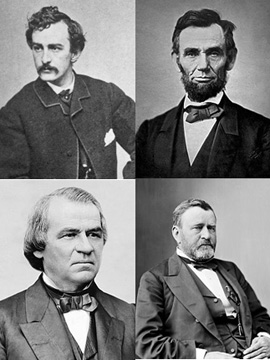John Wilkes Booth and the Legacy of Reconstruction
 How sorely we miss Abraham Lincoln—yet I often wonder whether we realize just how much.
How sorely we miss Abraham Lincoln—yet I often wonder whether we realize just how much.
A shrewd politician, Lincoln successfully navigated the complicated political waters of Washington for more than four years, somehow cobbling together a coalition to maintain support for the war and a “team of rivals” to manage it. His passage of the 13th Amendment in late January 1865 best exemplifies how he could “play the game,” managing a host of competing interests to achieve the greatest good.
We have had other shrewd chief executives in our history—perhaps even some shrewd enough to handle the complexities Lincoln faced in the closing days of the Civil War—but Andrew Johnson wasn’t one of them.
Johnson’s ascension to the presidency after Lincoln’s assassination shines the light on a flaw in our political process that continues to this day: the appointment of a running mate for so-called “balance” on the ticket rather than for political continuity. As a war Democrat from a seceded state who remained loyal to the Union, Johnson indeed looked like a shrewd choice for vice president—but it was a choice made under the assumption that Lincoln would serve out his term.
When Booth’s bullet soured the political mood from gracious victory to angry revenge, Ulysses S. Grant successfully shepherded subsequent surrender negotiations in accordance with the charitable vision Lincoln had laid out. But it was up to Johnson to officially pick up the baton and carry it forward. However, Johnson found himself thrust into a position well beyond his political capabilities. As a result, Reconstruction got off to a rocky start from which it never recovered as the president and the Congress squabbled, culminating in Johnson’s impeachment. By the time Grant rose to the presidency, the wheels were well off the wagon, and not even the man who won the war was able to win the peace.
What did Booth think would happen after he killed the president? In his blind hunger for revenge, had he given any thought to what a Johnson presidency would look like? As he yelled “Death to tyrants” to the audience at Ford’s Theater, did he have any idea how tyrannical the Radical Republican-controlled Congress would become?
Booth would not live to see the results of the tragedy he inflicted on the nation. His bullet killed not only Lincoln but, as it turned out, any hopes for peacefully assimilating the South back into the country. It also killed any chance for a national dialogue about race—a conversation we still struggle to have.
Only the keenest of minds and shrewdest of politicians could have navigated those postwar waters. It’s impossible to tell what results Lincoln would have met with, but he had at least proven himself up to the task of managing Washington during the war. I can’t help but miss his steady hand guiding the peace.
Lincoln was probably the most threatend President (2nd only to current Pres.) which should have given him great pause in 1984 to be careful about the Vice President he chose. After Johnson’s fiasco on Inaugeration Day, Lincoln had to wonder about his choice. But there was a hubris about his dealing with threats. Where was Seward and Stanton’s advice on the topic of succession, particularly since Stanton was always worrying? What was the then line of succession in 1865 and what if Thaddedus Stevens was in line, somehow. Wouldn’t that cause one to buy stock in rope and gallows wood as a Reconstruction Policy?
Some interesting questions, Ed. Thanks for chipping in. I agree about Lincoln’s hubris, which might have also been informed by a big dose of national naivety. After all, they don’t shoot presidents in the U.S., do they?
Outstanding perspective, Chris. No question the events 150 years ago tonight altered the course of U.S. and world history.
On a related note, Butler and Rosecrans were both near-picks for VP in 1864. Perhaps the only two Vice Presidents selected with an eye to them becoming President before the next election were Truman and Gerald Ford.
I was deeply impressed by Frank Varney’s book about Grant and the rewriting of history, in which Varney contends (credibly) that Grant basically wrote Rosecrans out of the war’s history. Imagine how that might have all played out had Rosecrans been VP–and then president!
I especially like the way you start your brief article. I could not agree with you more about your total thought.